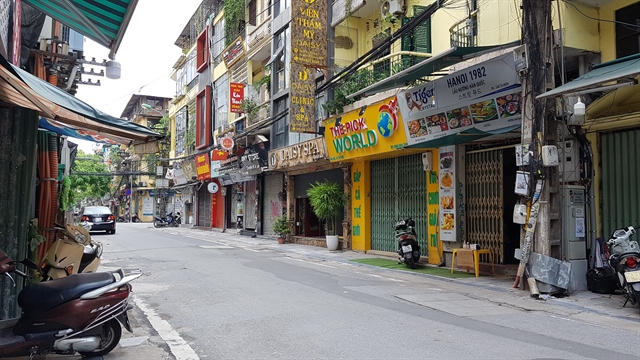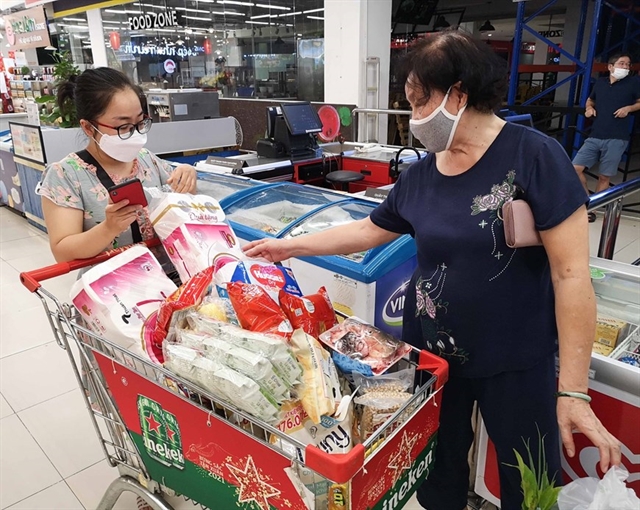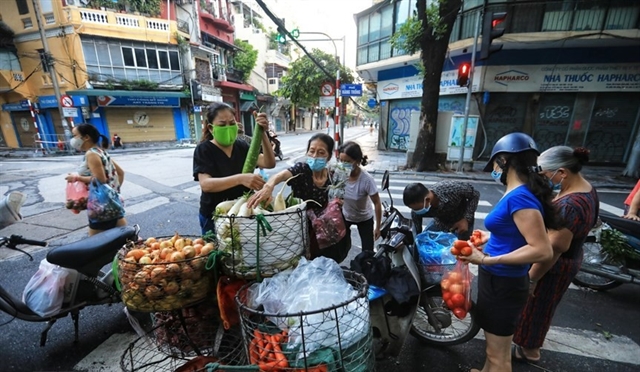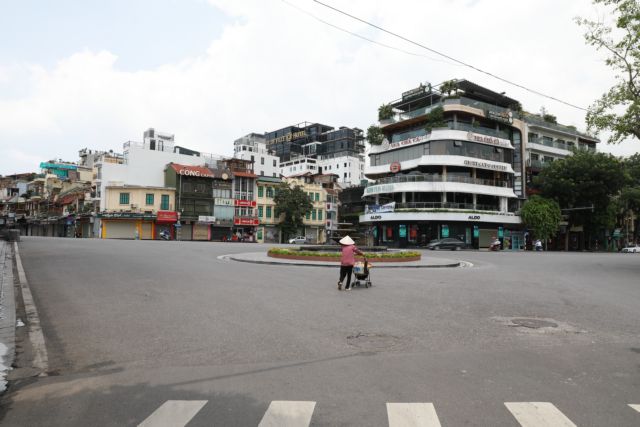 Society
Society


|
| A street in the Old Quarter was empty on Saturday, the first day Hà Nội implemented Directive 16. — VNS Photo Bảo Hoa |
Vân Nguyễn
As Hà Nội enters the first days of the social distancing to fight COVID-19, many of its residents say although the lockdown might make life uncomfortable, it is an effective measure to halt the spread of the virus.
Nguyễn Thị Tưởng, who is at her 70s and lives on her owns in Hoàng Mai District, found her neighbourhood eerily quiet on Saturday.
Learning about the new order from neighbours in the morning, she went to the market to buy groceries for a few days to limit the time she needs to spend outdoors.
Her daughter who lives with her own family a few kilometres away, dropped by to give Tưởng some extra food.
Her two other children are living in Hồ Chí Minh City and call her regularly to learn about the current the situation.
“For me, there’s nothing to concern about," said Tưởng, who gave up her street food stand more than a year ago due to COVID-19.
"There is almost no change in my life. I have stayed home most of the time recently when there was increasing number of infections.
“The social distancing order is reasonable and I believe this will be an effective strategy to halt the spread of the virus in Hà Nội.”
Instead of gathering with neighbours to have a chat and enjoy green tea together every morning, Tưởng said she would try not to leave her house and avoid direct contacts with others.
Unlike Tưởng, some other people seem are worried about food supplies despite the municipal Department of Industry and Trade on July 21 insisting there is sufficient supply of essential goods for locals amid the implementation of more stringent social distancing measures.

|
| Local people buy groceries at a supermarket on Saturday morning. VNA/VNS Photo Thành Đạt |
Hoàng Kim Liên, a teacher and mother of two, spent the whole morning on the first day Hà Nội applied strict social distancing measure following the Prime Minister's Directive 16 was implemented for groceries.
“I made four trips to markets and supermarkets to buy food," Liên said.
"Going to supermarkets took more time because they allowed only a certain number of customers in at a time and I had to queue for 30 minutes.”

|
| People buy vegetables and fruits in Hàng Trống Street Saturday morning. — VNA/VNS Photo Thành Đạt |
She bought meat including four frozen chickens, canned food and lots of vegetables and fruits to ensure her family has a variety of food.
Adapt to life in quarantine
The normally crowded areas including Hoàn Kiếm Lake and the Old Quarter which often bustle with traffic and trading activities, were almost deserted on Saturday as non-essential commercial activities are banned and people are urged to stay indoors and only allowed to leave home for certain reasons including shopping for necessities or getting medical treatment.
Many say they are not surprised at the tough measures, but welcome the order of the authorities, hoping it will help things return to normal soon.
Vũ Thị Nhung, 28, closed her clothing shop in Phú Xuyên District, some 40km from city’s centre, on Saturday.
Her husband, who works in Phú Thọ Province, was supposed to end his work term and return home this week but had to extend his stay in the province due to the social distancing order.
Nhung said: “I feel sad with the prospect of two weeks without seeing my husband, friends and my customers but given the rapid transmission of the new variant and complex developments in many parts of the country, Hà Nội is reasonable to impose strict social distancing measures.

|
| Hà Nội applied strict social distancing measures across the city from 6am on Saturday July 24. — VNS Photo Bảo Hoa |
“Lockdown means no customers and loss revenue for my business but I think it’s an affordable price to pay for our own safety.”
Unlike the first lockdown in April 2020 when fear gripped the capital’s residents, this time people are calm and more “chilled”, Nhung said.
There is less panic buying this time in her neighbourhood, she said.
Nhung bought just a little more groceries than usual so she doesn’t have to go outdoors to shop many times a week.
“The prices of food including eggs and vegetables are a bit higher than normal but it is still at an acceptable level,” she said, adding that those entering the local market in her area are required to submit health declarations.
Nhung said she learned from the first lockdown that groceries were always in an abundance so there was no need to stockpile and panic buy.

|
| Under Directive 16, people are urged to stay indoors and are only allowed to leave home for certain reasons including shopping for necessities or getting medical treatment. — VNS Photo Bảo Hoa |
Living far from her newly wed husband, Nhung said she prepared herself with home entertainment to stay positive for the next two weeks.
“I will spend time to watch lots of movies, a hobby that I couldn’t afford due to busy daily life as well as eat healthily to boost the immune system,” she said.
For other young people, this is a chance for them to live more slowly.
Nguyễn Thị Tâm, 28, who works for a local software corporation, sees the two-week period as a positive opportunity to invest time for things that she would like to change.
She said: “Social distancing might be tough for many, especially those whose job are affected by it. I am fortunate that I still have job and can work from home.”
Working from home, online support, video calls and Zoom meetings have been a new culture at her company.
Tâm and her colleagues have been allowed to work from home since early June so the new social distancing order doesn’t cause much disruption to her work life.
“We have been adapted to interacting with colleagues through screens and feel quite comfortable with this new mode of working with frequent virtual meetings,” she said.
Tâm said with the travel time saved from remote working, she has more time to improve her business English and have quality time with her family.
“Whether we want it or not, it is a reality that we have to adapt to. The pandemic has taught me to accept the uncertainty and be okay if plans need to be changed,” she added. VNS